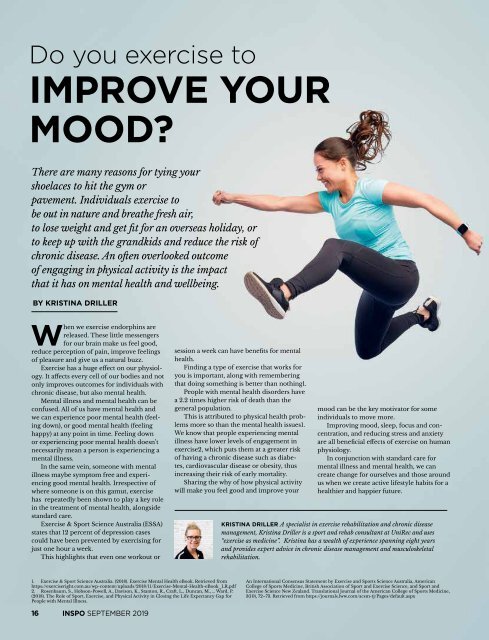INSPO Magazine September 2019
Everything from nutrition, beauty, home and workplace wellbeing to health, performance – and so much more.
Everything from nutrition, beauty, home and workplace wellbeing to health, performance – and so much more.
You also want an ePaper? Increase the reach of your titles
YUMPU automatically turns print PDFs into web optimized ePapers that Google loves.
Do you exercise to<br />
IMPROVE YOUR<br />
MOOD?<br />
There are many reasons for tying your<br />
shoelaces to hit the gym or<br />
pavement. Individuals exercise to<br />
be out in nature and breathe fresh air,<br />
to lose weight and get fit for an overseas holiday, or<br />
to keep up with the grandkids and reduce the risk of<br />
chronic disease. An often overlooked outcome<br />
of engaging in physical activity is the impact<br />
that it has on mental health and wellbeing.<br />
BY KRISTINA DRILLER<br />
When we exercise endorphins are<br />
released. These little messengers<br />
for our brain make us feel good,<br />
reduce perception of pain, improve feelings<br />
of pleasure and give us a natural buzz.<br />
Exercise has a huge effect on our physiology.<br />
It affects every cell of our bodies and not<br />
only improves outcomes for individuals with<br />
chronic disease, but also mental health.<br />
Mental illness and mental health can be<br />
confused. All of us have mental health and<br />
we can experience poor mental health (feeling<br />
down), or good mental health (feeling<br />
happy) at any point in time. Feeling down<br />
or experiencing poor mental health doesn’t<br />
necessarily mean a person is experiencing a<br />
mental illness.<br />
In the same vein, someone with mental<br />
illness maybe symptom free and experiencing<br />
good mental health. Irrespective of<br />
where someone is on this gamut, exercise<br />
has repeatedly been shown to play a key role<br />
in the treatment of mental health, alongside<br />
standard care.<br />
Exercise & Sport Science Australia (ESSA)<br />
states that 12 percent of depression cases<br />
could have been prevented by exercising for<br />
just one hour a week.<br />
This highlights that even one workout or<br />
session a week can have benefits for mental<br />
health.<br />
Finding a type of exercise that works for<br />
you is important, along with remembering<br />
that doing something is better than nothing1.<br />
People with mental health disorders have<br />
a 2.2 times higher risk of death than the<br />
general population.<br />
This is attributed to physical health problems<br />
more so than the mental health issues1.<br />
We know that people experiencing mental<br />
illness have lower levels of engagement in<br />
exercise2, which puts them at a greater risk<br />
of having a chronic disease such as diabetes,<br />
cardiovascular disease or obesity, thus<br />
increasing their risk of early mortality.<br />
Sharing the why of how physical activity<br />
will make you feel good and improve your<br />
mood can be the key motivator for some<br />
individuals to move more.<br />
Improving mood, sleep, focus and concentration,<br />
and reducing stress and anxiety<br />
are all beneficial effects of exercise on human<br />
physiology.<br />
In conjunction with standard care for<br />
mental illness and mental health, we can<br />
create change for ourselves and those around<br />
us when we create active lifestyle habits for a<br />
healthier and happier future.<br />
KRISTINA DRILLER A specialist in exercise rehabilitation and chronic disease<br />
management, Kristina Driller is a sport and rehab consultant at UniRec and uses<br />
“exercise as medicine”. Kristina has a wealth of experience spanning eight years<br />
and provides expert advice in chronic disease management and musculoskeletal<br />
rehabilitation.<br />
1. Exercise & Sport Science Australia. (2018). Exercise Mental Health eBook. Retrieved from<br />
https://exerciseright.com.au/wp-content/uploads/2018/11/Exercise-Mental-Health-eBook_LR.pdf<br />
2. Rosenbaum, S., Hobson-Powell, A., Davison, K., Stanton, R., Craft, L., Duncan, M., … Ward, P.<br />
(2018). The Role of Sport, Exercise, and Physical Activity in Closing the Life Expectancy Gap for<br />
People with Mental Illness.<br />
An International Consensus Statement by Exercise and Sports Science Australia, American<br />
College of Sports Medicine, British Association of Sport and Exercise Science, and Sport and<br />
Exercise Science New Zealand. Translational Journal of the American College of Sports Medicine,<br />
3(10), 72–73. Retrieved from https://journals.lww.com/acsm-tj/Pages/default.aspx<br />
16 <strong>INSPO</strong> SEPTEMBER <strong>2019</strong>


















